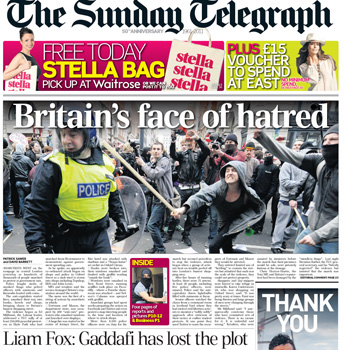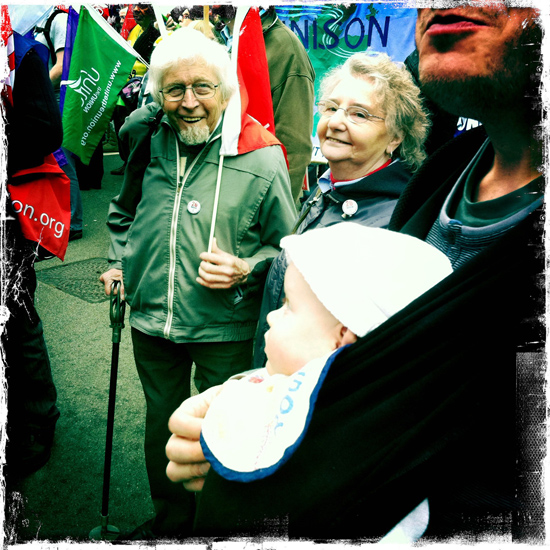On Sunday, we stopped at some services just off the M1 where I bought a bottle of Sprite. Whilst paying for this overpriced but - due to a rather bad hangover - much needed fizzy liquid I took a quick glance at the shop's rack of Sunday papers.
Unsurprisingly, most of the front pages were covering the 'March for the Alternative', the anti-cuts protest which saw 250,000 or 500,000 people (depending on whether you believe the Police or the protest's organisers) march through Central London in protest against the very deep cuts to public services.
I was one of those protestors, and although I have a large beard at the moment, it is more by accident than design, so before you ask I am not a hippy, a trade union member, a communist, an anarchist or even in Red Ed's Labour Party. I will possibly own up to being a beardy weirdy, circa 1969-71, but that's probably more to do with taste in music than politics and the look I'm going for with my next record. Mainly I was there because like a lot of dudes, bearded or no, I'm quite fond of British public services.
Anyway, enough of the beard stuff. Where was I? Oh yes, in a service station, bottle of Sprite in hand, hungover and looking at examples of fine British journalism. I was expecting the papers to cover the march in a negative light - but I really wasn't expecting there to be quite such a disparity between what actually happened on Saturday and what was being reported. I and the other 249,999 or so peaceful protestors might as well have been on another march, on another planet; certainly not at the event that was being written about on the front pages of virtually every one of the respectable British newspapers I was looking at (if that's a correct way of describing them; last time I looked most British newspapers seemed to be owned by foreign, rich, eccentric tycoons, but that's another day's moan).
The event that the press was portraying was one of anarchy; violence; chaos; war. Yes, there was some violence, for which 149 people were charged. That is, on the Police figures, 0.06% of the total turnout, or, based on the organisers' figures, 0.03%. Either way it would appear that 99.94% to 99.97% of those protesting were not charged with any wrong-doing or violence. It was an overwhelmingly peaceful protest, and all of us aforementioned peaceful people were angry - in a peaceful way of course - that some idiots had disturbed our, well, peacefulness.
Maybe it was too much to expect that a paper of record, The Sunday Times, might make more of the fact that hundreds of thousands of British people from all walks of life came out to protest against their own government than that a profoundly small minority caused violence. Or that so-called 'quality broadsheets' would focus exclusively on 'carnage', 'battles', 'chaos', 'violence' and accompany these lurid descriptions with pictures of an unruly but entirely unrepresentative mob. What was being reported was not the 'March for the Alternative', but some weird 'Alternative March for the Alternative', completely at odds with reality.

But whilst I was irritated by most of the coverage, one front page actually made me feel genuinely sad. The Sunday Telegraph had a huge picture of a policeman being attacked by some guy with a stick, accompanied by the headline 'Britain's Face of Hatred'.
This picture and headline instantly and deeply undermined up to half a million people, from all sections of British society, from all age groups and from all backgrounds, who had come together and marched not out of hatred but in support of an idea that is arguably the polar opposite of hatred: the idea that we are, to coin a phrase, 'all in this together'; that public services matter; that they transform lives for the better; and that they should not be slated, sacrificed and privatised because of the huge greed of the banking sector. Even if we who were marching in support of public services are profoundly misguided, and the controversial austerity measures are going to eventually solve all of Britain's economic problems, we were not remotely marching out of hate; we genuinely believe that public services are a force for good that make lives better for millions - and that every step should be taken to protect them and fund them properly. Idealistic, perhaps, but not hateful.
The Sunday Telegraph's front page will have been seen by countless other hungover guys in motorway services all across Britain. Or people popping to the corner shop for a pint of milk. And for millions this in-your-face, out-of-context image will give a lasting impression that the March for the Alternative was a march for hatred. But it's not how the event was, or what it was about.
I took another snap of the 'March for the Alternative'. It's unlikely to be seen on the front page of a newspaper; it will probably go no further than the little band of devoted and perhaps unfortunate readers who read my scribblings. But it's a picture which tells the story of the day in a much more honest way, and shows what it was about. You can take a look below.

